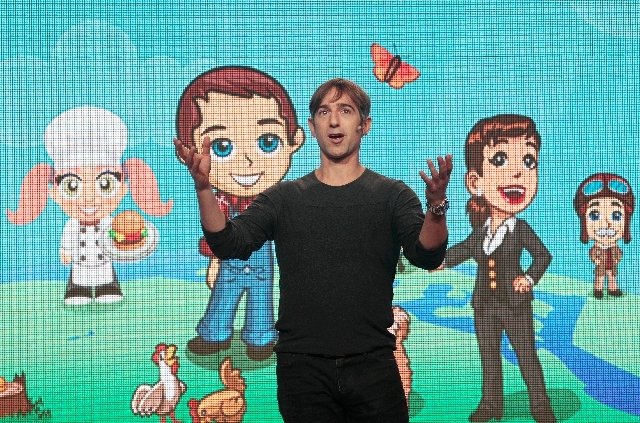Down on the Farmville, Zynga wrestles with multiple issues

Things are not all peaceful down on the farm.
Social gaming giant Zynga Inc., which has a grand vision of converting its platform into a real money pay-to-play online gambling format in Nevada, slashed 18 percent of its workforce and closed multiple offices to cut costs this past week.
The San Francisco-based company, which developed free-play social games such as “FarmVille,” “Mafia Wars” and “Words With Friends,” said the layoffs and closures will save $70 million to $80 million annually.
Zynga took the first step toward Nevada licensing with an application for a preliminary finding of suitability in December.
On Monday, Zynga took on the characteristics of a Strip casino operator.
Corporate gaming giants cut jobs and costs during the recession, when customer casino visits diminished and patrons spent less.
At the same time, social gaming flourished on Facebook and other platforms. New social gaming websites and applications seemed to pop up weekly. Even Strip casino operators, such as MGM Resorts International, launched free-play social gaming.
But Zynga’s fortunes reflect a market now oversaturated.
The company’s free-play Texas Hold’em poker game ranks among the top applications on Facebook. Zynga focused much of its efforts on Internet-based games. The market, however, has been moving toward mobile devices.
Zynga sliced 5 percent of its workforce in cutbacks in the fall of 2012. On Monday, Zynga’s share price fell 12 percent, to $2.99 on the Nasdaq. By Friday, Zynga’s shares were down to $2.84, roughly 75 percent below the company’s December 2011 IPO price.
Analysts said Zynga is banking much of its future on cracking Nevada’s neophyte online gaming market.
“Beyond some residual value of current franchises, much of Zynga’s value is based on the potential for real-money gambling, which is still speculative and the timing uncertain,” Macquarie Securities research analyst Ben Schachter told investors.
Internet gaming in Nevada is restricted to poker on sites controlled by state-licensed casino operators. Ultimate Gaming, for example, is majority owned by Station Casinos.
Zynga would like to offer a pay-to-play version of its Texas Hold’em poker game in Nevada but needs a partner. Initial speculation focused on a deal with Wynn Resorts Ltd., but those reports have gone silent.
A finding of suitability by the Nevada Gaming Commission would give Zynga an edge over social gaming technology providers. In July, Paddy Power, the top legal bookmaker in the United Kingdom, Canada and Australia, was found suitable.
Rival online gaming provider 888 Holdings, a partner of Caesars Entertainment Corp., is fully licensed by Nevada. Licensing of MGM Resorts and Boyd Gaming Corp. partner Bwin.party is still in the investigative stage. Zynga’s suitability hearing might not happen until the end of the year.
For now, the main goal is to keep Zynga financially viable.
According to Forbes, Zynga founder Mark Pincus told employees in a blog post that cutting 520 jobs and closing offices in Los Angeles and New York was a necessary step to move forward.
“None of us ever expected to face a day like today, especially when so much of our culture has been about growth,” Pincus wrote.
As it announced cutbacks, Zynga said its net loss in the second quarter could be as much as $39 million.
“Zynga’s key problem remains the same; finding a way to leverage its user base while transitioning to mobile,” Schachter said. “Outside of the ‘FarmVille’ franchise, weakness was broad-based across Zynga’s portfolio. Mobile revenues have not grown rapidly enough to offset the sharp decline in the desktop side of the business.”
The casino side of Wall Street had a tough time understanding social gaming.
Slot machine giant International Game Technology’s $500 million acquisition of Seattle-based social gamer DoubleDown Casino in February 2012 was widely panned.
It has taken more than a year for the investment community to get comfortable with the purchase. Customers play DoubleDown games for free, but often buy additional gaming tokens.
IGT has been converting versions of the company’s popular slot machine titles to the DoubleDown format, especially on Facebook. In the past quarter, IGT said bookings for the average daily user to DoubleDown increased 100 percent to 28 cents per player, which the company said was more than four times the rate of Zynga.
Unlike Zynga, IGT can fall back on its market-leading slot machine business.
Social gaming became a quick fix for Internet gaming fans following the federal government’s April 2011 crackdown on illegal online poker.
But with Nevada’s recent push into legal, pay-to-play online poker and the potential for New Jersey, Delaware and other states to buy into the game, social gaming could be relegated to the secondary tables.
Howard Stutz’s Inside Gaming column appears Sundays. He can be reached at
hstutz@reviewjournal.com or 702-477-3871.
Follow @howardstutz on Twitter.












